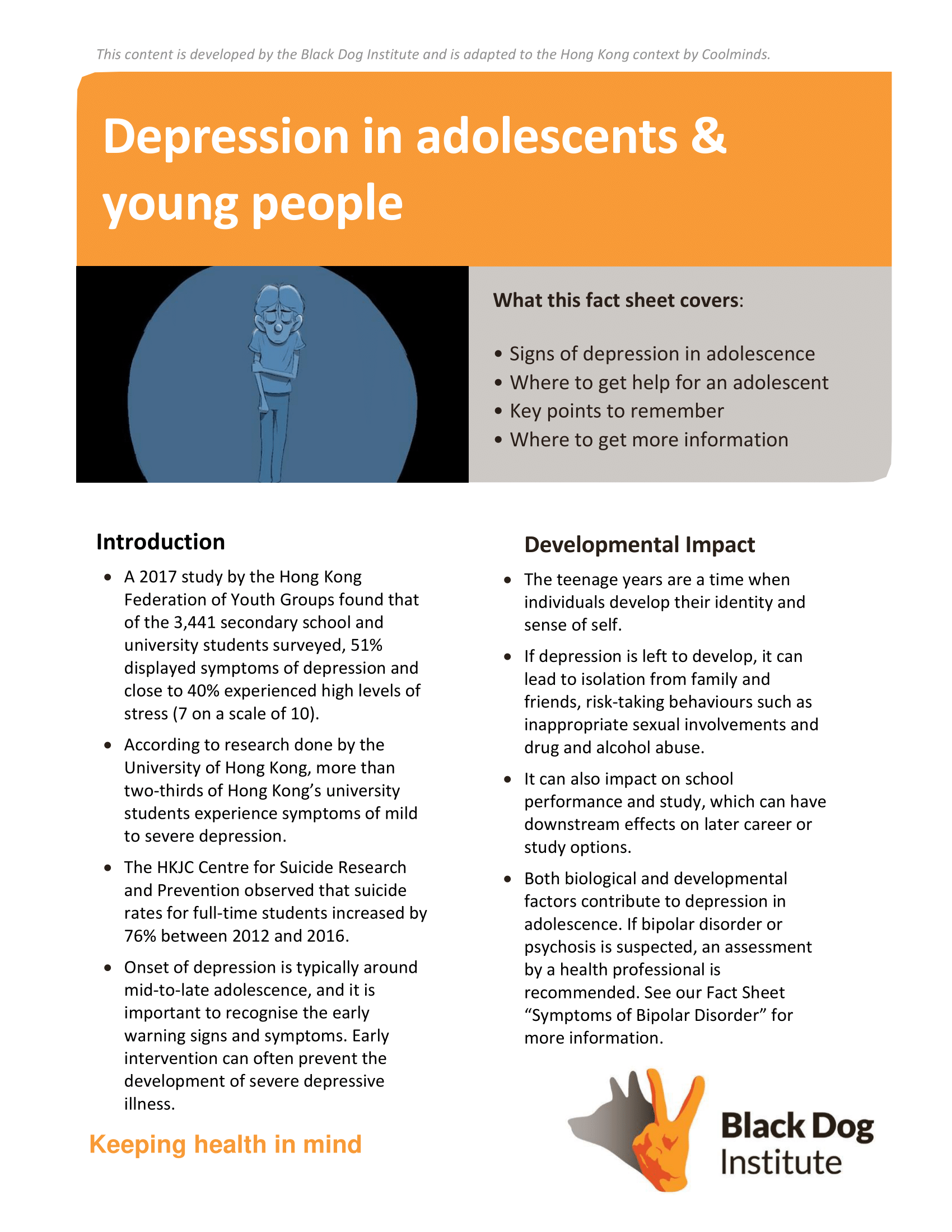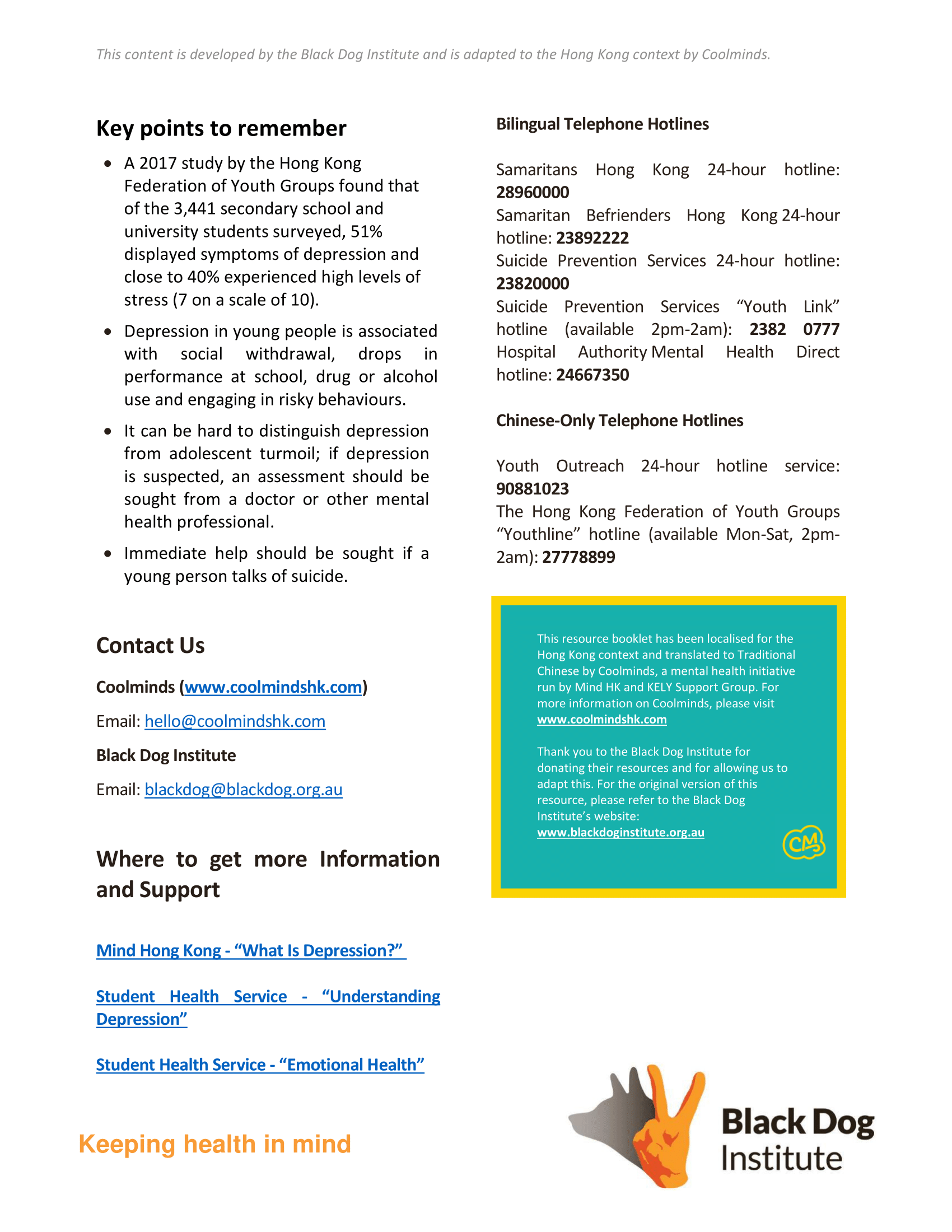This resource booklet has been localised for the Hong Kong context and translated to Traditional Chinese by Coolminds, a mental health initiative run by Mind HK and KELY Support Group. For more information on Coolminds, please visit www.coolmindshk.com
Thank you to the Black Dog Institute for donating their resources and for allowing us to adapt this. For the original version of this resource, please refer to the Black Dog Institute’s website: www.blackdoginstitute.org.au
What this fact sheet covers:
- Signs of depression in adolescence
- Where to get help for an adolescent
- Key points to remember
- Where to get more information
Introduction
- A 2017 study by the Hong Kong Federation of Youth Groups found that of the 3,441 secondary school and university students surveyed, 51% displayed symptoms of depression and close to 40% experienced high levels of stress (7 on a scale of 10).
- According to research done by the University of Hong Kong, more than two-thirds of Hong Kong’s university students experience symptoms of mild to severe depression.
- The HKJC Centre for Suicide Research and Prevention observed that suicide rates for full-time students increased by 76% between 2012 and 2016.
- Onset of depression is typically around mid-to-late adolescence, and it is important to recognise the early warning signs and symptoms. Early intervention can often prevent the development of severe depressive illness.
Developmental Impact
- The teenage years are a time when individuals develop their identity and sense of self.
- If depression is left to develop, it can lead to isolation from family and friends, risk-taking behaviours such as inappropriate sexual involvements and drug and alcohol abuse.
- It can also impact on school performance and study, which can have downstream effects on later career or study options.
- Both biological and developmental factors contribute to depression in adolescence. If bipolar disorder or psychosis is suspected, an assessment by a health professional is recommended. See our Fact Sheet “Symptoms of Bipolar Disorder” for more information.
Signs of depression in an adolescent
- An adolescent who is depressed may not show obvious signs of depression.
- It is often hard to distinguish adolescent turmoil from depressive illness, especially when the young person is forging new roles within the family and struggling with independence, and having to make academic and career decisions.
Signs of a depressed mood include:
- Lowered self-esteem (or self-worth)
- Changes in sleep patterns, that is, insomnia (inability to sleep), hypersomnia (excessive sleep) or broken sleep
- Changes in appetite or weight
- Inability to control emotions such as pessimism, anger, guilt, irritability and anxiety
- Varying emotions throughout the day. For example, feeling worse in the morning and better as the day progresses.
- Reduced capacity to experience pleasure: inability to enjoy what’s happening now, not looking forward to anything with pleasure such as hobbies or activities.
- Reduced pain tolerance: decreased tolerance for minor aches and pains
- Poor concentration and memory
- Reduced motivation to carry out usual tasks
- Lowered energy levels
Where to get help for an adolescent
- If you think someone you are close to might be depressed, you should encourage them to seek advice from a professional. (At school – school counsellor, social worker. Outside school – doctor, counsellor, psychologist)
- The first step is to speak to a professional who can conduct an assessment, provide options and discuss the next steps to take.
- Other initial sources of help are school counsellors and trusted close family members to whom the young person feels comfortable talking.
- If the young person does not want to seek help, it is best to explain your concerns and to provide them with some information to read about depression.
- There are also some excellent websites designed for young people, as well as confidential online and telephone counselling services in both English and Chinese. Please see our list of services at the end of this fact sheet.
- It’s important for young people to know that depression is a common problem and that there are people who can help.
- If there is any mention of suicide this should be taken seriously, and immediate assistance is available by calling 999 or going directly to the nearest hospital.
Key points to remember
- A 2017 study by the Hong Kong Federation of Youth Groups found that of the 3,441 secondary school and university students surveyed, 51% displayed symptoms of depression and close to 40% experienced high levels of stress (7 on a scale of 10).
- Depression in young people is associated with social withdrawal, drops in performance at school, drug or alcohol use and engaging in risky behaviours.
- It can be hard to distinguish depression from adolescent turmoil; if depression is suspected, an assessment should be sought from a doctor or other mental health professional.
- Immediate help should be sought if a young person talks of suicide.
Contact Us
Coolminds
Email: hello@coolmindshk.com
Black Dog Institute
Email: blackdog@blackdog.org.au
Where to get more Information and Support
Mind Hong Kong – “What Is Depression?”
Student Health Service – “Understanding Depression”
Student Health Service – “Emotional Health”
Bilingual Telephone Hotlines
Samaritans Hong Kong 24-hour hotline: 28960000
Samaritan Befrienders Hong Kong 24-hour hotline: 23892222
Suicide Prevention Services 24-hour hotline: 23820000
Suicide Prevention Services “Youth Link” hotline (available 2pm-2am): 2382 0777
Hospital Authority Mental Health Direct hotline: 24667350
Chinese-Only Telephone Hotlines
Youth Outreach 24-hour hotline service: 90881023
The Hong Kong Federation of Youth Groups “Youthline” hotline (available Mon-Sat, 2pm-2am): 27778899





